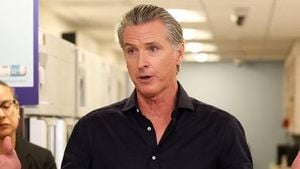Four astronauts have made their return to Earth after an extended mission aboard the International Space Station (ISS) which lasted almost eight months. This much-anticipated homecoming, taking place on October 25, 2024, had been delayed due to issues related to Boeing's Starliner capsule and the impact of Hurricane Milton.
The astronauts involved included NASA's Matthew Dominick, Michael Barratt, Jeanette Epps, and Russian cosmonaut Alexander Grebenkin. Their SpaceX Crew-8 mission was intended to safely bring them back to Earth, but several obstacles meant they remained much longer aboard the ISS than planned. Initially, they were meant to return earlier, but safety problems with Boeing’s capsule derailed these plans.
Hurricane Milton's unpredictable weather also delayed their return. After undocking from the ISS midweek, the astronauts were able to safely splash down in the Gulf of Mexico, just off the Florida coast, early Friday morning. They returned aboard the SpaceX Dragon Endeavour capsule, which descended to Earth, parachuting down gently and marking another successful operation for SpaceX.
This return isn't just significant because of the astronauts' extended stay. The situation also highlights the challenges currently faced by Boeing's Starliner program. Earlier this year, the Starliner capsule made headlines when it was forced to return empty due to safety concerns. This raised eyebrows about Boeing's reliability as the company strives to support NASA's astronaut transport needs.
During their eight months on the ISS, the crew carried out numerous scientific experiments and engaged with various technological developments. Despite this, the extended mission was not without its difficulties, as Barratt, who is the only veteran astronaut on the crew, remarked on the adaptability required from everyone involved. He acknowledged how the support teams back home had to “replan, retool and kind of redo everything right along with us ... and helped us to roll with all those punches.”
The crew’s return also restores the crew composition on the ISS. For some time, it has operated with additional crewmembers due to the overflow caused by delays from not just the Boeing delays but other variables emanated from the tight operational schedules. With the return of Crew-8, the ISS crew numbers are back to normal with four Americans and three Russians currently on board.
Meanwhile, the astronauts who returned will enjoy some downtime and reflection on the invaluable time spent on the space station. They have certainly made their mark during their extended stay, but it's the collaboration between NASA, SpaceX, and national partners like Russia's space agency, Roscosmos, which remains at the forefront of international space exploration efforts.
Looking to the future, the replacements for Crew-8 are set. The upcoming missions, featuring test pilots Butch Wilmore and Suni Williams from Boeing, will likely engage their own set of mission parameters as they continue to push forward NASA's human spaceflight initiatives. The presence of both seasoned and newer astronauts exemplifies the symbiotic relationship between collaboration and progress, which is key for what lies ahead.
Now, with Crew-8 back on solid ground, the focus will shift toward enhancing the safety and reliability of space missions. The future, especially as space travel becomes more routine, will depend heavily on addressing the issues raised during this mission, particularly those involving the Boeing Starliner.
Four astronauts have returned, but this saga serves as more than just another trip home. It speaks volumes about the hurdles yet to be overcome as commercial and governmental space programs strive to achieve their ambitious goals.
Indeed, as space exploration continues to captivate public interest, events like this remind us of the inherent challenges and extraordinary accomplishments of human ingenuity. The questions of safety, reliability, and technological advancement remain pivotal as space agencies pave the way for future missions beyond Earth.



